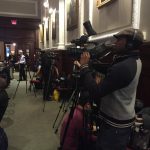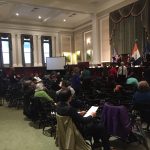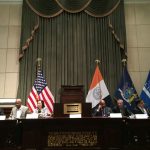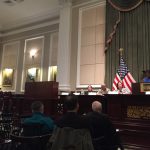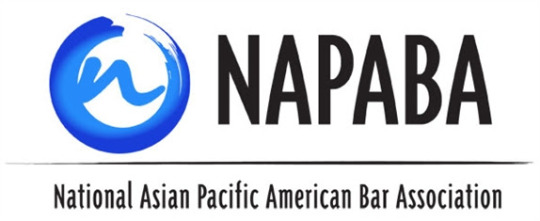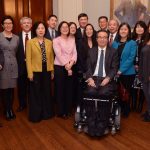FOR IMMEDIATE RELEASE:
CONTACT:
Jo-Ann Yoo, (212) 344-5878, x217, joann.yoo@aafederation.org
New York City – October 6, 2017: Yesterday, the Asian American Federation held a rally at Trump Tower with our member agencies and leading immigrant advocacy groups to speak out in support of Asian American Deferred Action for Childhood Arrivals (DACA) recipients, who are being impacted by the dissolution of the DACA program under the Trump administration. Twenty-three organizations and nearly 200 New Yorkers, including Congresswoman Grace Meng, Council Member Margaret Chin, Assemblymember Yuh-line Niou, Manhattan Borough President Gale Brewer, and Comptroller Scott Stringer, joined hands with the Federation to defend the future of our DREAMers.
On the day that marked the deadline to apply for DACA status renewal, organizers mobilized protestors across the pan-Asian community and other immigrant communities to call on Congress to pass a clean DREAM Act as well as extend Temporary Protected Status (TPS) for eligible immigrants from designated countries. Currently, over 136,000 Asian Americans in the U.S. – and over 13,000 Asian Americans in New York State alone – will be stripped of any protection from deportation (or lose the opportunity to apply for such protection) come March of next year, when the DACA program is scheduled to expire. This will leave a significant number of our young people at immediate risk of losing everything, including being subject to imminent deportation. Moreover, TPS expirations begin in January 2018, leaving approximately 9,000 Nepalis vulnerable to losing their TPS in June and having to return to an unstable home country.
The strong turnout at the Asian. American. Dreamer. Rally made it clear to the Trump administration and Congress that the Asian community and other immigrant communities will not stand silently by the sidelines while our family members, friends, colleagues, and neighbors are under threat of losing their civil liberties. DACA beneficiaries have made vital social and economic contributions to the only country they call home, and their removal from our systems will not only tear apart families but also lead to a national economic decline of $433.4 billion over the next decade. Similarly, TPS recipients undergird a significant portion of our workforce in domestic and personal care services, whose exodus would leave many of these industries unable to fill the demand for services.
Jo-Ann Yoo, executive director of the Asian American Federation, said, “We have never been a country that punishes children for their parents’ decisions or turns our back on those who most need our help. The President has rescinded on his promise to protect our vulnerable young people by passing the buck to Congress. Now, Congress must make the moral decision of passing a clean DREAM Act to provide the future generation with an opportunity to live out the lives they were promised.”
Congresswoman Grace Meng (D-Queens) said, “DACA has allowed approximately 800,000 DREAMers to come out of the shadows and contribute to our country. The President’s decision to end the program is inhumane and openly abandons American values. I will keep up the fight in Congress to pass legislation that would allow DREAMers to remain in the United States, and I continue to stand with all these hard-working young people who know America as their only home.”
“President Trump’s cruel decision to end DACA and threaten the Temporary Protected Status program is an affront to who we are as Americans,” said Senator Kirsten Gillibrand. “It doesn’t make us safer, it doesn’t make our economy stronger, and it goes against everything the Statue of Liberty represents. I will continue to fight for our incredible DREAMers and TPS recipients, including the thousands of Asian New Yorkers who will be directly harmed if these protections are taken away from them, and I urge all of my colleagues in the Senate to do the right thing and join me in this fight.”
Rep. Nydia M. Velázquez (D-NY) said, “DREAMers bring new talents and skills to our economy, and they are contributing to every facet of American life. Without DACA, these young people are forced to live in the shadows. Congress must do the right thing and immediately pass a clean DREAM Act.”
Mayor Bill de Blasio said, “The 30,000 Dreamers in this city are our friends, family, and neighbors – and New Yorkers through and through. I urge Congress to act quickly and pass the DREAM Act so these cherished members of our community can stay in the only home they have ever known. In the meantime, free, confidential legal help is available to residents by calling 311 and asking for ActionNYC.”
“Much like today’s DACA recipients, I was once a young immigrant who came to this country in the hope of forging a better life,” said Council Member Margaret S. Chin. “We cannot and must not deny this generation of Dreamers the same opportunity. I join our community in calling on Congress today to act to pass a clean Dream Act.”
“Many in our immigrant communities feel threatened by the Trump Administration’s efforts to destroy protections for Dreamers,” said Assemblymember Deborah J. Glick. “We cannot stand by and let the lives of undocumented young people be destroyed in order to appeal to those who believe that our diversity is a liability. We must band together and push back against anti-immigrant measures in order to demonstrate to the Trump Administration that our diversity is in fact our country’s greatest asset.”
Assemblyman Ron Kim said, “We need to stand up for those who were brought here as children and have grown up in this country. They have made lives for themselves here. Their success is our success, and we cannot abandon them now.”
“Our message to Trump and Congress is simple: DACA needs to stay, and New York’s Asian American community stands firmly behind Dreamers,“ said Assemblywoman Yuh-Line Niou. “Immigrants contribute immensely to our communities, and it is critical that we prevent thousands of young Americans, including Asian American Dreamers, from being pushed into the shadows. I will continue to stand by our Dreamers, and I look forward to working with my colleagues and Asian American advocates to protect immigrant communities across New York State.”
“It is critical that we stand with our communities and join together in speaking out against hate. That is why I strongly support the urgent call to pass the DREAM Act, legislation that will protect Asian American DREAMers and immigrant communities in New York and across the country,” said Assemblywoman Nily Rozic (D,WF-Fresh Meadows).
“We are a country built by immigrants, a culture made richer by immigrants, and a community held together by immigrants. Congress must find the moral courage to stand up to the bigotry and xenophobia of this administration and reinstate DACA immediately,” said Public Advocate Letitia James.
“The President’s decision to end DACA without permanent legislative relief is as cruel as it gets. As the renewal date sunsets, I am proud to stand with an unprecedented coalition of pan-Asian leaders to urge Congress to do the right thing and pass a clean DREAM Act immediately,” said New York City Comptroller Scott M. Stringer.
“I stand in solidarity with the thousands of Asian American DACA recipients whose lives are being negatively impacted by the Trump administration’s dissolution of DACA,” said Council Member Daniel Dromm (D-Elmhurst, Jackson Heights). “DACA is a humane program that has helped thousands of immigrant New Yorkers earn a living and provide for their families. President Trump’s DACA phase-out is heartless and reckless. It flies in the face of all that this country stands for. Congress must immediately pass a comprehensive DREAM Act that will fix our broken immigration system once and for all. As a Council Member representing one of the largest Asian American populations in New York, I will do all that I can to defend DACA’s future and advocate for comprehensive immigration reform.”
Council Member Rory Lancman said, “Donald Trump’s decision to end the DACA program is cruel, callous, and goes against the basic values that make our country great. DACA recipients, thousands of whom live in New York City, contribute greatly to our economy and our communities. These incredible young people should be permitted to continue their pursuit of the American Dream, instead of being forced back to a country they barely know. I am proud to stand with the DREAMers and will work every day to support our immigrant communities.”
“We will not stand by silently while the Trump Administration risks the well-being of immigrant New York, including the one million Asian American immigrants that call New York home,” said Steven Choi, executive director of the New York Immigration Coalition. “We are proud to join our partners at the Asian American Federation to defend DACA and TPS, and to protect the people who truly make America great.”
Margaret Fung, executive director of the Asian American Legal Defense and Education Fund (AALDEF), said “Since the inception of the DACA program in 2012, AALDEF has worked closely with undocumented AAPI youth to screen for DACA eligibility and to provide them with pro bono representation in filing their DACA applications. As a national organization that protects and promotes the civil rights of Asian Americans, we are calling on Congress to move forward legislation that will protect DACA recipients and other undocumented young immigrants, as well as a long-term legislative fix for the rest of the approximately 11 million undocumented individuals living in the United States.”
“Tearing apart the lives and families of young people – who are just trying to better themselves in America – will be the only accomplishment of ending DACA,” said Christopher Kui, executive director of Asian Americans for Equality. “We all have an obligation to hold up the ideals of our country and in no way does that include deporting the American Dream.”
“The effort to dissolve DACA is yet another example of this administration’s misguided policies that are destroying our country rather than ‘making it great’! Immigrants are built into the very fabric of America, and without immigrants, America would fall apart – economically, socially and politically,” said Annetta Seecharran, executive director of Chhaya Community Development Corporation.
“Chinese immigrants, regardless of their status, have been making significant contributions to this country since the 1800s. We stand with everyone here today to defend DACA and support a ‘clean’ DREAM Act,” said Mae Lee, executive director of the Chinese Progressive Association.
“The Chinese-American Planning Council stands united with our Dreamers and allies in urging Congress to pass a clean DREAM Act and protections inclusive of all immigrants. As the nation’s largest Asian American social services organization, we are committed to providing a welcoming and supportive environment for individuals of all backgrounds,” said Wayne Ho, executive director of the Chinese-American Planning Council.
Kavita Mehra, executive director of Sakhi for South Asian Women said, “Sakhi for South Asian Women firmly opposes President Trump’s decision to end the DACA program. We stand with our immigrant community, remain committed to serving all survivors that walk through our doors regardless of immigration status, and believe that all people are worthy of living with dignity, respect, and opportunity.”
Robina Niaz, executive director of Turning Point for Women and Families, said, “At Turning Point for Women and Families, we work actively with immigrant and Muslim families on a daily basis. We are deeply concerned that educational and employment opportunities and other protection programs currently available to DACA recipients are being threatened. We stand united in the fight against the elimination of DACA and fully support our immigrant sisters and brothers. We call on Congress to protect immigrants’ right to life without fear of deportation and prevent families from being torn apart.”
Rally Co-Sponsors: Adhikaar, Alliance of South Asian American Labor, Arab American Association of New York, Asian American Arts Alliance, Asian American Bar Association of New York, Asian American Legal Defense and Education Fund, Asian Americans for Equality, Chhaya Community Development Corporation, Chinese-American Planning Council, Chinese Progressive Association, Council of People’s Organization, Desis Rising Up and Moving, Japanese American Association of New York, Japanese American Social Services, Inc., Korean American Family Service Center, Korean Community Services of Metropolitan New York, MinKwon Center for Community Action, National Queer Asian Pacific Islander Alliance, New York Immigration Coalition, OCA-NY, Sakhi for South Asian Women, Turning Point for Women and Families, University Settlement
The Asian American Federation works to raise the influence and well-being of the pan-Asian American community through research, policy advocacy, public awareness, and organizational development. Established in 1989, AAF supports over 40 Asian American community service agencies, which work to meet the critical needs of the fastest-growing population in New York City. For more information, please visit www.aafederation.org.


